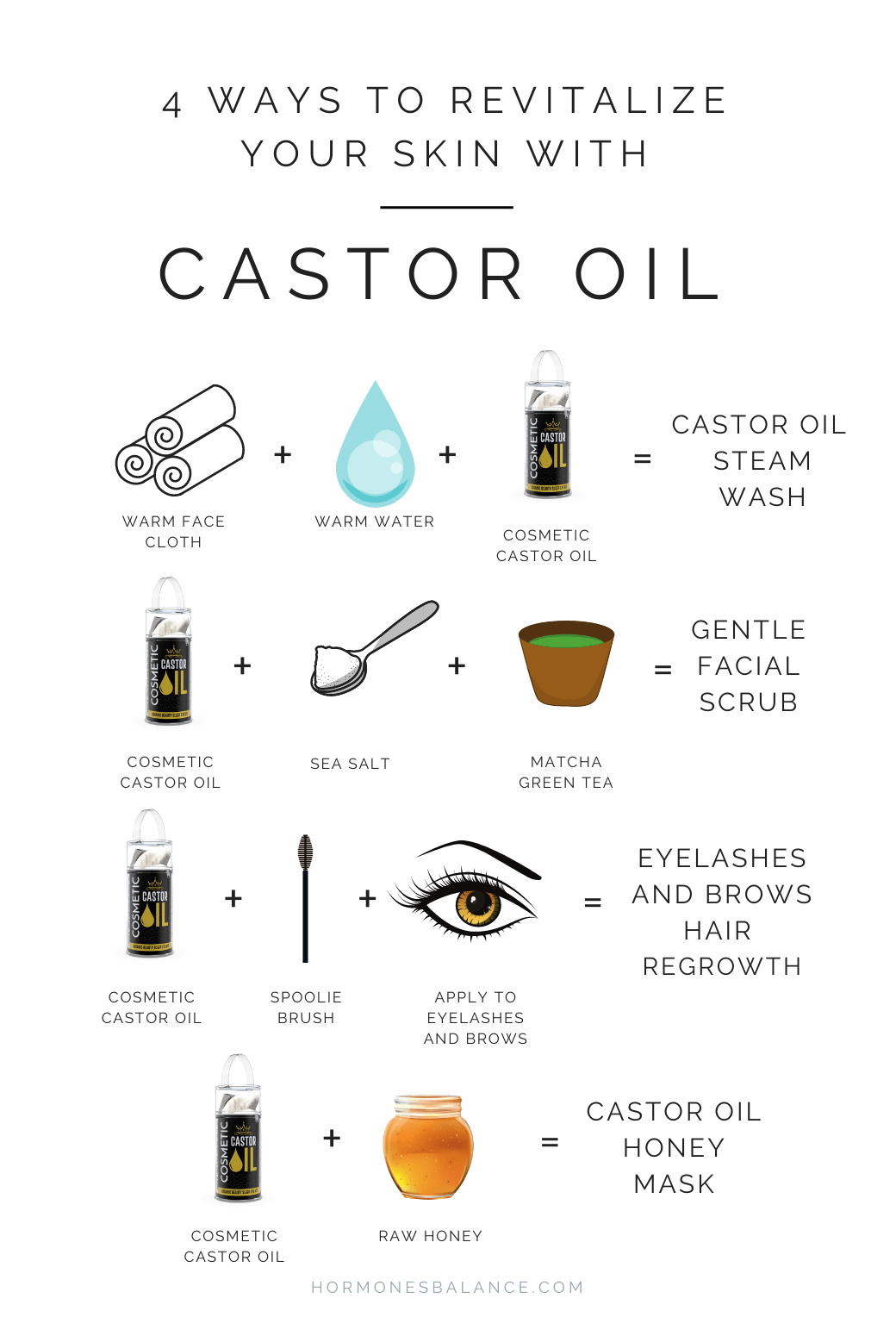Table Of Content

Moist skin looks better than dry skin—think of a raisin versus a grape,” Dr. Evans says. If you are using it on your eyebrows, start with a very small amount, and be extra careful not to get the oil into your eyes. This article is based on scientific evidence, written by experts and fact checked by our trained editorial staff. Note that the numbers in parentheses (1, 2, etc.) are clickable links to medically peer-reviewed studies. Dr. Rebecca Marcus is a board-certified dermatologist who specializes in medical, surgical, and cosmetic dermatology. She has nearly two decades of experience and completed her residency along with a clinical research fellowship at Columbia University.
Benefits of Castor Oil for Hair and Skin
"Pure castor oil is very viscous, so it can cause hair to feel oily and weighed down if too much is applied," Butler adds. Though many people use castor oil as a treatment for dry or thinning hair, there’s no evidence that castor oil is effective for improving hair health or stimulating hair growth when used on its own. Another way castor oil benefits the skin and hair is by improving circulation. When massaged into the skin or scalp, castor oil helps to stimulate blood flow, which can promote hair growth and give your skin a healthy glow.
Is coconut oil or castor oil better for hair?
Either use the oil sparingly or concoct your own castor oil hair serum. "I suggest blending with a carrier oil like jojoba or coconut, and mix a minimum of four parts carrier oil and one part castor oil," recommends Dr. Burg. I don't know about you, but I'm two seconds away from pouring it all over my head.
How do you apply castor oil to hair?

TBH, it's basically the oldest trick in the book—as far as my ancestors are concerned. My family is from Pakistan, so I’ve grown up with the ritual of hair oiling, an Ayurvedic practice involving applying oil directly to your scalp and hair, massaging it in, and allowing it to sit for an extended period. Castor oil has been used for centuries to treat constipation and may be a good natural moisturizer for your skin and scalp. But there's not much scientific evidence for other possible health benefits.
Castor Oil for Hair Growth: The Benefits, Risks, and How to Use It
A vegetable oil derived from the seeds of the castor bean plant, castor oil is also known as Ricinus communis. The main active component of castor oil is ricinoleic acid, a type of fatty acid shown to possess anti-inflammatory properties. You might have heard that castor oil can do incredible things for eyelash growth. Unfortunately, the science doesn’t bear out that claim—and any lush-lash effect is likely more of an illusion. However, the oil may create a healthier environment for eyelashes to grow by keeping them moisturized, Dr. Waibel says.
“Overuse and improper hair washing of castor oil may also lead to build up, which may also contribute to irritation and breakouts,” she says. To create a natural heat protector, “apply a castor oil mixture on semi-dry ends, then heat style as normal to protect against high heat appliances and prevent frizzy results and split ends,” Yates adds. There are various options when it comes to using castor oil for your hair and scalp, including choosing products that contain castor oil and incorporating them into your hair-care routine. Many claims have been made about the benefits of using castor oil on your hair. However, little evidence supports the anecdotes that say it improves hair health and growth. Swimming in saltwater can dry hair out, so next time you go to the beach or the lake, pre-treat your hair with a light coating of castor oil.
What Type of Castor Oil for Hair?

Castor oil can be very beneficial for hair growth if used correctly. Like many things in life, more is not always better, and only a few drops are needed per treatment. There is a special type of castor oil called Jamaican black castor oil that has extremely good reviews. I tried it as well and it seemed to work about the same as regular castor oil on my hair, but it seems that it might provide additional benefit for those with thick or dry hair (my hair is fine/oily). In fact, castor oil has traditionally been used topically for acne and other skin conditions, as well as hair loss, rashes, and more. If you want to try it for skincare, I recommend this handcrafted castor oil cleansing blend.
The Therapeutic Benefits of CASTOR OIL (Skin/Face/Hair)
It's incredibly lightweight (even for my fine hair ppl), but is still jam-packed with Ayurvedic staples like ashwagandha and dashmool to help soothe my irritated scalp. There are no specific number of days you should be oiling your hair, says Dr. Spann, but for most people, once a week is sufficient. “For individuals with severely dry or brittle hair, it may be beneficial to oil two to three times per week,” adds Dr. Spann.
Helen Mirren's go-to beauty secret for ageless skin, hair and nails is on sale for just $13 - Yahoo Life
Helen Mirren's go-to beauty secret for ageless skin, hair and nails is on sale for just $13.
Posted: Wed, 18 Oct 2023 07:00:00 GMT [source]
Hair Oiling Is the Ayurvedic Secret to My Healthy, Silky Hair
The FDA says it's safe for treating constipation, but researchers are still investigating its other potential health benefits. From soothing skin ailments to promoting healthy hair growth, castor oil has stood the test of time as a go-to solution for various health and beauty concerns. Its rich history is a testament to its effectiveness and the wisdom of our ancestors. Some people apply castor oil topically to the scalp and hair as a hair conditioner to treat dandruff or to make hair shiny. While some research has found that castor oil might improve the appearance of hair by increasing its luster, this evidence, too, is fairly weak and not conclusive. Castor oil has natural antibacterial and antifungal properties and is high in vitamin E, minerals, proteins, and omega-6 and -9 beneficial fatty acids.
Castor oil is an age-old beauty treatment that has been largely replaced over time by fancier beauty products with more ingredients and a bigger price tag. Castor oil has long been used as a folk remedy to jumpstart labor; in addition to stimulating intestinal contractions, some animal studies suggest that it could trigger contractions in the uterus. Whether it actually works is unclear, but it’s better to err on the side of caution and avoid consuming it, says Sherry Ross, M.D., OB/GYN at Providence St. John’s Medical Center in Santa Monica, California. Because castor oil functions as a lubricant, it can add help make dry, frizzy strands look smoother, Dr. Evans says. But in that respect, you’d likely get the same benefits from any type of oil you might already have in the pantry. Castor oil has moisturizing and soothing properties, allowing it to ease dryness and irritation of the scalp.
Due to a lack of research, there are no official recommendations for the dosage of castor oil. It's possible to be allergic to the castor plant, as contact dermatitis has been reported in rare cases after using topical castor oil. Typically, these and other side effects will subside once castor oil use stops. Another study involved 612 women whose pregnancies lasted longer than 40 weeks. The study's authors found that the time to birth was not significantly different between those who took the oil and those who did not. Our experts continually monitor the health and wellness space, and we update our articles when new information becomes available.






















